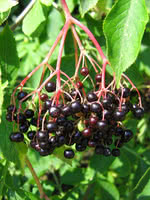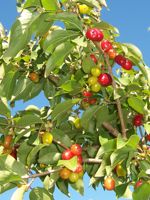Mon-Fri 9am - 5pm Mountain time
Black Elderberry vs Cornelian Cherry Dogwood
Sambucus canadensis
Cornus mas
NOT AVAILABLE THIS SEASON - MIGHT RETURN
NOT AVAILABLE THIS SEASON - MIGHT RETURN
Black Elderberry is a deciduous shrub native to eastern North America. You can plant this shrub in moist areas and it will help stabilize your soil. You can also use it on rural properties anywhere you'd use a lilac.
Black Elderberries are considered to be partially self-pollinating. So while they will still produce some berries without cross-pollination, planting with another variety will increase yields. Consider planting with Ranch Elderberry or Bob Gordon Elderberry.
Warning: the seeds, stems, leaves, roots, and uncooked berries of the Black Elderberry are poisonous to humans when eaten in quantity. You should cook the berries to make them safe for human consumption.
Cornelian Cherry Dogwood is an ornamental plant with a variety of uses as it can be grown as a shrub, small tree, hedge, or privacy screen. The bright yellow flowers grow in clusters and bloom in late winter to early spring, providing an early food source for pollinators. They are visually striking as the flowers bloom before the leaves appear and last for several weeks.
Red, cherry-like fruits are produced in midsummer. They are edible but are better suited for preserves and syrups as the taste is fairly sour and astringent, similar to that of sour cherries and cranberries.
The Cornelian Cherry Dogwood was the winner of the Gold Medal Award from The Pennsylvania Horticultural Society as well as the Cary Award for having superior landscape appeal and for being winter hardy and pest resistant.
Black Elderberry Quick Facts
Cornelian Cherry Dogwood Quick Facts
Toxicity: leaves, stems, and uncooked berries are poisonous to humans

